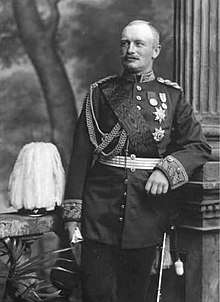Frederick Augustus III of Saxony
Frederick Augustus III (German: Friedrich August III.; 25 May 1865 – 18 February 1932) was the last King of Saxony (1904–1918) and a member of the House of Wettin. Born in Dresden, Frederick Augustus was the eldest son of King George of Saxony and his wife, Maria Anna of Portugal.
| Frederick Augustus III | |||||
|---|---|---|---|---|---|
 | |||||
| King of Saxony | |||||
| Reign | 15 October 1904 – 13 November 1918 | ||||
| Predecessor | George | ||||
| Successor | Monarchy abolished | ||||
| Born | 25 May 1865 Dresden, Kingdom of Saxony, German Confederation | ||||
| Died | 18 February 1932 (aged 66) Sibyllenort, Landkreis Oels, Province of Lower Silesia, Free State of Prussia, Weimar Republic (present-day Szczodre, Lower Silesian Voivodeship, Poland) | ||||
| Burial | Katholische Hofkirche | ||||
| Spouse | Archduchess Louise of Austria (m. 1891; div. 1903) | ||||
| Issue | Georg, Crown Prince of Saxony Friedrich Christian, Margrave of Meissen Prince Ernst Heinrich Princess Maria Alix Karola Princess Margarete Karola Princess Maria Alix Luitpolda Princess Anna | ||||
| |||||
| House | Wettin | ||||
| Father | George of Saxony | ||||
| Mother | Maria Anna of Portugal | ||||
| Religion | Roman Catholicism | ||||
Frederick Augustus served in the Royal Saxon Army before becoming king, and later was promoted to Generalfeldmarschall. Though well-loved by his subjects, he voluntarily abdicated as king on 13 November 1918, after the defeat of the German Empire in World War I. He died in Sibyllenort (now Szczodre) in Lower Silesia and was buried in Dresden.
Military career
Frederick Augustus entered the Royal Saxon Army in 1877 as a second lieutenant, despite being only twelve years old. Given his royal status, he advanced rapidly through the ranks. He served initially with the Royal Saxon 1. (Leib-) Grenadier Regiment Nr. 100. He was promoted to first lieutenant in 1883, captain in 1887, major in 1889 and lieutenant colonel in 1891. By 1891, he was commander of the 1st Battalion of Schützen (Füsilier)-Regiment Nr. 108. He was promoted to colonel on 22 September 1892 and took command of the Schützen (Füsilier)-Regiment Nr. 108 on the same day. On 20 September 1894, the 29-year-old prince was promoted to Generalmajor and given command of the 1st Royal Saxon Infantry Brigade Nr. 45 (Saxon higher units usually bore two numbers: one their Saxon Army number and the other their number in the Prussian Army order of battle). On 22 May 1898, he was promoted to Generalleutnant and given command of the 1st Royal Saxon Infantry Division Nr. 23. He commanded this division until 26 August 1902, when he took command of the XII (1st Royal Saxon) Corps. He was promoted to General der Infanterie one month later, on 24 September. He remained in command of the corps until October 1904, when he became king. His military career effectively ended with his accession to the throne, but he was promoted subsequently to Generaloberst and then to Generalfeldmarschall (on 9 September 1912).
Following his father's accession, he was in July 1902 appointed à la suite of the German Marine Infantry by Emperor Wilhelm II during a visit to Kiel.[1]
Family
Frederick Augustus married Archduchess Luise, Princess of Tuscany, in Vienna on 21 November 1891. They were divorced in 1903 by the royal decree of the King after she ran away while pregnant with her last child. Luise's flight from Dresden was due to her father-in-law's threatening to have her interned in Sonnestein Mental Asylum for life. Her brother supported her in her wish to escape Saxony. Emperor Franz-Josef of Austria-Hungary did not recognise the divorce.
They had seven children:
- Friedrich August Georg, Crown Prince of Saxony (1893–1943). After becoming a Jesuit priest, he renounced his rights in 1923. He was allegedly assassinated by the SS or Gestapo in 1943.
- Friedrich Christian, Margrave of Meissen, Duke of Saxony (1893–1968). Married Princess Elisabeth Helene of Thurn and Taxis (1903–1976) and had issue.
- Ernst Heinrich (1896–1971). Married first Princess Sophie of Luxembourg (1902–1941), daughter of Guillaume IV, Grand Duke of Luxembourg, in 1921 and second Virginia Dulon (1910–2002) in 1947 (morganatically). Had issue with Sophie.
- Maria Alix Carola, stillborn 22 August 1898
- Margarete Carola Wilhelmine (1900–1962). Married Prince Friedrich of Hohenzollern (1891–1965).
- Maria Alix Luitpolda (1901–1990). Married Franz Joseph, Prince of Hohenzollern-Emden (1891–1964).
- Anna Monika Pia (1903–1976). Married firstly Archduke Joseph Franz of Austria (1895–1957) and secondly Reginald Kazanjian (1905–1990).
Their two eldest sons, Friedrich August and Friedrich Christian were born in the same year, 1893, but were not twins. Friedrich August was born in January, while Friedrich Christian was born in December.
Quotes
- When standing in uniform on a station platform, a lady asked him to move her trunk. He is reported to have replied, "Madam, I am not a porter; I only look like one."[2]
- When the German Republic was proclaimed in 1918, he was asked by telephone whether he would abdicate willingly. He said: "Oh, well, I suppose I'd better."[3]
- Upon abdicating, he is supposed to have said "Nu da machd doch eiern Drägg alleene!" (Saxon for "Well then take care of this crap yourselves!"), but there is no documentation of this.
- When cheered by a crowd in a railroad station several years after his abdication, he stuck his head out of the train's window and shouted "Ihr seid mer ja scheene Demogradn!" (Saxon for "You're a fine lot of republicans, I'll say!"[3]).
Decorations and awards
.svg.png)
- Knight of the Rue Crown, 1877;[5] Grand Master, 15 October 1904
- Knight of the Military Order of St. Henry, 21 October 1914[6]
- Grand Master of the Albert Order
- Grand Master of the Civil Order of Saxony
- Saxon Service Order, 1st Class (25 years service)
.svg.png)
- Knight of the House Order of Fidelity, 1884
- Knight of the Order of Berthold the First, 1884
.svg.png)
- Knight of St. Hubert, 1886[8]
- Grand Cross of the Military Order of Max Joseph
.svg.png)
.svg.png)
.svg.png)
.svg.png)
- Knight of the Black Eagle, with Collar[4]
- Pour le Mérite (military), 29 December 1916[6]
- Iron Cross, 1st and 2nd Classes
.svg.png)

.svg.png)
- Grand Cross of St. Stephen, 1886
- Knight of the Golden Fleece, 1889
- Grand Cross of the Military Order of Maria Theresa, 1917

.svg.png)

- Knight of St. Andrew[4]
- Knight of St. Alexander Nevsky

.svg.png)
.svg.png)
Ancestry
| Ancestors of Frederick Augustus III of Saxony | |||||||||||||||||||||||||||||||||||||||||||||||||||||||||||||||||||||||||||||||||||||||||||||||||||||||||||||||||||||||||||||||||||||||||||||||||||||||||||||||||||||||||||||||||||||||||||||||||||||||||||||||||||||||||||||||||||||||||||||||||||||||||||||||||||||||||||||||||||||||||
|---|---|---|---|---|---|---|---|---|---|---|---|---|---|---|---|---|---|---|---|---|---|---|---|---|---|---|---|---|---|---|---|---|---|---|---|---|---|---|---|---|---|---|---|---|---|---|---|---|---|---|---|---|---|---|---|---|---|---|---|---|---|---|---|---|---|---|---|---|---|---|---|---|---|---|---|---|---|---|---|---|---|---|---|---|---|---|---|---|---|---|---|---|---|---|---|---|---|---|---|---|---|---|---|---|---|---|---|---|---|---|---|---|---|---|---|---|---|---|---|---|---|---|---|---|---|---|---|---|---|---|---|---|---|---|---|---|---|---|---|---|---|---|---|---|---|---|---|---|---|---|---|---|---|---|---|---|---|---|---|---|---|---|---|---|---|---|---|---|---|---|---|---|---|---|---|---|---|---|---|---|---|---|---|---|---|---|---|---|---|---|---|---|---|---|---|---|---|---|---|---|---|---|---|---|---|---|---|---|---|---|---|---|---|---|---|---|---|---|---|---|---|---|---|---|---|---|---|---|---|---|---|---|---|---|---|---|---|---|---|---|---|---|---|---|---|---|---|---|---|---|---|---|---|---|---|---|---|---|---|---|---|---|---|---|---|---|---|---|---|---|---|---|---|---|---|---|---|---|---|---|---|
| |||||||||||||||||||||||||||||||||||||||||||||||||||||||||||||||||||||||||||||||||||||||||||||||||||||||||||||||||||||||||||||||||||||||||||||||||||||||||||||||||||||||||||||||||||||||||||||||||||||||||||||||||||||||||||||||||||||||||||||||||||||||||||||||||||||||||||||||||||||||||
Notes
- "Latest intelligence - the German Emperor and Saxony". The Times (36812). London. 5 July 1902. p. 7.
- "In Saxony". Time Magazine. 1925-08-10. Retrieved 2008-08-09.
- "Milestones, Feb. 29, 1932". Time. 29 February 1932. Retrieved 2 May 2010.
- Justus Perthes, Almanach de Gotha (1923) pp. 108-109
- Staatshandbuch für den Freistaat Sachsen (1878) (in German), "Königliche Ritter-Orden", p. 3
- "Friedrich August III. Johann Ludwig Karl Gustav König von Sachsen". the Prussian Machine. Retrieved 5 August 2020.
- Hof- und Staats-Handbuch des Großherzogtum Baden (1888), "Großherzogliche Orden" pp. 62, 74
- Hof und Staatshandbuch für den Königreich Bayern (1906) (in German), "Königliche Orden", p. 7
- Staatshandbücher für das Herzogtum Sachsen-Coburg und Gotha (1890), "Herzogliche Sachsen-Ernestinischer Hausorden" p. 46
- Staatshandbuch für das Großherzogtum Sachsen / Sachsen-Weimar-Eisenach (1900), "Großherzogliche Hausorden" p. 16
- Hof- und Staats-Handbuch des Königreich Württemberg (1907), "Königliche Orden" p. 29
- "Ritter-Orden", Hof- und Staatshandbuch der Österreichisch-Ungarischen Monarchie, 1918, pp. 50, 52, 55, retrieved 2 November 2019
- Sveriges Statskalender (in Swedish), 1915, p. 671, retrieved 2018-01-06 – via runeberg.org
- Royal Thai Government Gazette (23 March 1899). "พระราชทานเครื่องราชอิสริยาภรณ์ ที่ประเทศยุโรป" (PDF) (in Thai). Retrieved 2019-05-08. Cite journal requires
|journal=(help) - "Caballeros extranjeros del collar de la Orden de Carlos III", Guóa Oficial de España (in Spanish), 1920, p. 213, retrieved 12 July 2020
External links
| Wikimedia Commons has media related to Frederick Augustus III of Saxony. |
- Frederick Augustus III of Saxony – ThePeerage.com
Frederick Augustus III of Saxony Born: 25 May 1865 Died: 18 February 1932 | ||
| Regnal titles | ||
|---|---|---|
| Preceded by George |
King of Saxony 15 October 1904 – 13 November 1918 |
Monarchy abolished German Revolution |
| Titles in pretence | ||
| Loss of title |
— TITULAR — King of Saxony 13 November 1918 – 18 February 1932 |
Succeeded by Friedrich Christian |